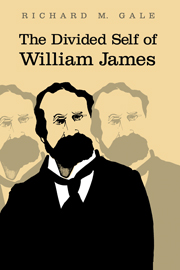Book contents
- Frontmatter
- Contents
- Acknowledgments
- Introduction
- The Promethean Pragmatist
- The Anti-Promethean Mystic
- 8 The Self
- 9 The I–Thou Quest for Intimacy and Religious Mysticism
- 10 The Humpty-Dumpty Intuition and Panpsychism
- 11 Attempts at a One-World Interpretation of James
- Appendix
- Bibliography of Works Cited
- Index
9 - The I–Thou Quest for Intimacy and Religious Mysticism
Published online by Cambridge University Press: 05 June 2012
- Frontmatter
- Contents
- Acknowledgments
- Introduction
- The Promethean Pragmatist
- The Anti-Promethean Mystic
- 8 The Self
- 9 The I–Thou Quest for Intimacy and Religious Mysticism
- 10 The Humpty-Dumpty Intuition and Panpsychism
- 11 Attempts at a One-World Interpretation of James
- Appendix
- Bibliography of Works Cited
- Index
Summary
The preceding chapter described the first lap of William James's quest for intimacy, in which he adopted the insider's approach to understanding the nature of his own Self through an introspective analysis of its conditions of identity over time. The next lap in his journey is his attempt to achieve a deep intimacy, ultimately a union, with the inner life of other persons, both natural and supernatural, even with the world at large.
The I–Thou Experience
James begins with a special inward manner in which one person experiences another as a “Thou” rather than an “It” and then extends this to the experience of the world at large, resulting in panpsychism. His analysis of the I–Thou experience bears a striking resemblance to that offered by Martin Buber some thirty years later. Buber starts with the “It” mode of experience.
The life of a human being does not exist merely in the sphere of goal-directed verbs. It does not consist merely of activities that have something for their object. I perceive something. I feel something. I want something. I sense something. The life of a human being does not consist merely of all this and its like. All this and its like is the basis of the realm of It. But the realm of Thou has another basis. (IT 54)
Buber's I–It experience is James's pragmatic mode of experiencing worldly individuals in terms of how we can ride herd on them and use them for the achievement of our goals.
- Type
- Chapter
- Information
- The Divided Self of William James , pp. 246 - 272Publisher: Cambridge University PressPrint publication year: 1999
- 1
- Cited by



